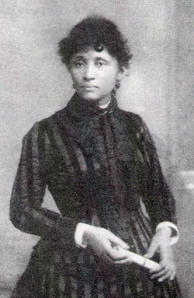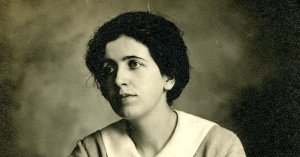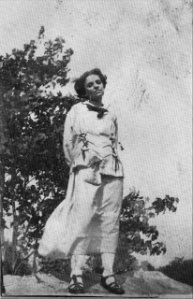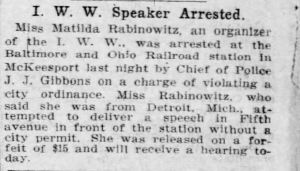Dr. Marie Equi, was born in 1872 in New Bedford, Massachusetts but found fame in the Northwest as an activist in Portland, Oregon., where she became the first woman to graduate University of Oregon Medical School in 1903. After supporting the Oregon Packing Plant strike in 1913, she contributed her speaking and organizing talents to the IWW local. It is interesting to note that as a professional, she was not allowed to become a dues paying member. Equi became a close friend of Elizabeth Gurley Flynn, joining her on the platform, raising money for those jailed in the Everett free speech fight.
Mary E. Marcy
Mary Edna (Tobias) Marcy, born 1877 in Belleville Illinois, championed the early IWW through her editorship of the leading radical journal of the day, the International Socialist Review. Orphaned at a young age, Marcy began her working life as a teen. At the age of 19, she was fired from a job for wearing a button supporting William Jennings Bryant’s presidential bid. Clarence Darrow heard of her dismissal and found her a job working for the president of the University of Chicago. She took advantage of the opportunity to enroll in classes tuition-free. In 1901, she married Leslie H. Marcy, and in 1903 they joined the Socialist Party. She assumed the managing editorship of the Review in 1909, and under her, it became “the fighting magazine of the working class.” Bill Haywood, Arturo Giovannnitti, Elizabeth Gurley Flynn and other Wobblies found a home in its pages. She regularly featured IWW activities and strikes and her 11 page account of the “Battle for Bread at Lawrence” is one of the most comprehensive contemporary reports of the strike. Women’s agitation was a consistent feature of articles under Marcy’s watch, though her own writings on women have been deemed controversial
Elizabeth Gurley Flynn – The Rebel Girl
In 1906, at the age of 16, Elizabeth Gurley Flynn joined the Industrial Workers of the World, quickly becoming one of the organization’s star agitators. For the next five years, she crisscrossed the country, honing her rhetorical skills in strikes and free speech fights in dozens of states. Throughout the summer and fall of 1911, she spent time in Lawrence, Massachusetts helping foreign-born woolen workers organize. When those workers stormed the streets of Lawrence in protest over a de facto pay cut in January of 1912, Gurley Flynn was immediately on the scene.
Helen Keller
Helen Keller, interviewed in 1916 by a reporter for the New York Tribune, explained her alliance with the Industrial Workers of the World, “I became an IWW because I found out that the Socialist party was too slow. It is sinking in the political bog. It is almost, if not quite, impossible for the party to keep its revolutionary character so long as it occupies a place under the government and seeks office under it.” Keller credited the Lawrence strike with bringing her attention to the Wobblies, and noted that its principles of immediate action appealed to her. The interviewer then asked, “What are you committed to–education or revolution?” “Revolution.” She answered decisively. “We can’t have education without revolution. We have tried peace education for 1,900 years and it has failed. Let us try revolution and see what it will do now.” The reported advised Keller that it might not be in her best interests to have such radical thoughts published, to which Keller responded, “I don’t give a damn about semi-radicals!” 
http://www.iww.org/history/library/HKeller/why_I_became_an_IWW
Lucy Gonzalez Parsons
 Born 1853 in Texas. Anarchist, free speech and labor activist. Founding member of the IWW, advocated “propaganda by deed” appropriated into early Wobbly rhetoric.
Born 1853 in Texas. Anarchist, free speech and labor activist. Founding member of the IWW, advocated “propaganda by deed” appropriated into early Wobbly rhetoric.
“When the prison, stake or scaffold can no longer silence the voice of the protesting minority, progress moves on a step, but not until then” Lucy Parsons, The Principles of Anarchism
Matilda Rabinowitz aka Matilda Robbins (Tatania Gitel Rabinowitz)
Matilda Rabinowitz, b. 1887 in the Ukraine, joined the Wobblies during the 1912 Bread & Strike in Lawrence, MA. Organized the strikers in Little Falls, NY that same year. Credited with organizing the first strike of US auto workers, Flint, MI 1931
http://jwa.org/teach/livingthelegacy/biographies/robbins-matilda
Pearl McGill
Ora Pearl McGill, born June 1894 in Iowa, began her career as a labor organizer while employed as a button worker in Muscatine. At the age of 17, Pearl was elected recording secretary and appointed to the executive committee of the Button Workers Protective Union (BWPU) No. 12854, an affiliate of the AFL. In 1911, she was identified as a “prominent delegate” to the annual convention of the Women’s Trade Union League, representing the Muscatine button-workers. In 1912, she joined the IWW, agitating throughout Massachusetts. She first came to prominence as a Wobbly during the Lawrence “Bread & Roses” Strike. McGill spent the next several years in Massachusetts, organizing workers and raising funds for jailed IWW leaders Joseph Ettor & Arturo Giovannitti.





